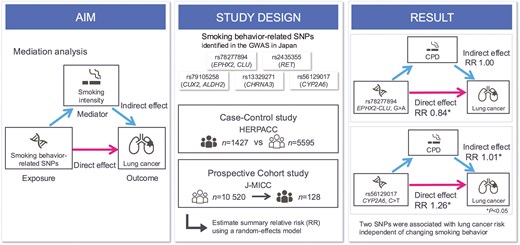-
Views
-
Cite
Cite
Sayaka Yamamoto, Yuriko N Koyanagi, Yuji Iwashita, Tomohiro Shinozaki, Yutaka Fujiwara, Noriaki Sakakura, Megumi Hara, Yuichiro Nishida, Jun Otonari, Hiroaki Ikezaki, Shiroh Tanoue, Chihaya Koriyama, Yumiko Kasugai, Isao Oze, Teruhide Koyama, Satomi Tomida, Nobuaki Michihata, Yohko Nakamura, Sadao Suzuki, Hiroko Nakagawa-Senda, Mako Nagayoshi, Yoko Kubo, Yasufumi Kato, Kenji Wakai, Takeshi Watanabe, Masashi Ishizu, Naoyuki Takashima, Aya Kadota, Yukihide Momozawa, Masahiro Nakatochi, Takashi Tamura, Akio Niimi, Hidemi Ito, Keitaro Matsuo, Smoking behavior-related genetic variants and lung cancer risk in Japanese: an assessment by mediation analysis, Carcinogenesis, Volume 46, Issue 2, February 2025, bgaf011, https://doi.org/10.1093/carcin/bgaf011
Close - Share Icon Share
Abstract
Cigarette smoking is one of the most important risk factors for lung cancer. Genetic studies have shown that smoking behavior-related genetic variants are directly associated with lung cancer, independent of smoking behavior, mainly in European populations. A recent genome-wide association study in Japan identified five loci associated with the number of cigarettes smoked per day. This study aimed to evaluate whether these loci are associated with lung cancer risk directly or indirectly through changing smoking behavior. Here, we conducted a case-control study (1427 cases and 5595 controls) and a prospective cohort study (128 incident cases in 10 520 subjects). Using mediation analysis, we decomposed the total effect of the lead single nucleotide polymorphism (SNP) at each locus on lung cancer risk into direct and indirect effects. The results of the two studies were pooled using a random-effects model to estimate summary relative risks (RRs) and their 95% confidence intervals (CIs). Two studies showed that: (i) rs78277894 (EPHX2-CLU, G > A) had a protective direct effect (RR: 0.84; 95% CI: 0.77–0.93) on lung cancer risk; and (ii) rs56129017 (CYP2A6, C > T) had carcinogenic direct and indirect effects on lung cancer risk (RR: 1.26; 95% CI: 1.15–1.39 and RR: 1.01; 95% CI: 1.00–1.01, respectively). This mediation analysis revealed that two smoking behavior-related SNPs, EPHX2-CLU rs78277894 and CYP2A6 rs56129017, were associated with lung cancer risk through pathways independent of changing smoking behavior. Our findings may contribute to our understanding of lung carcinogenesis pathways that cannot be addressed by changes in smoking behavior.




